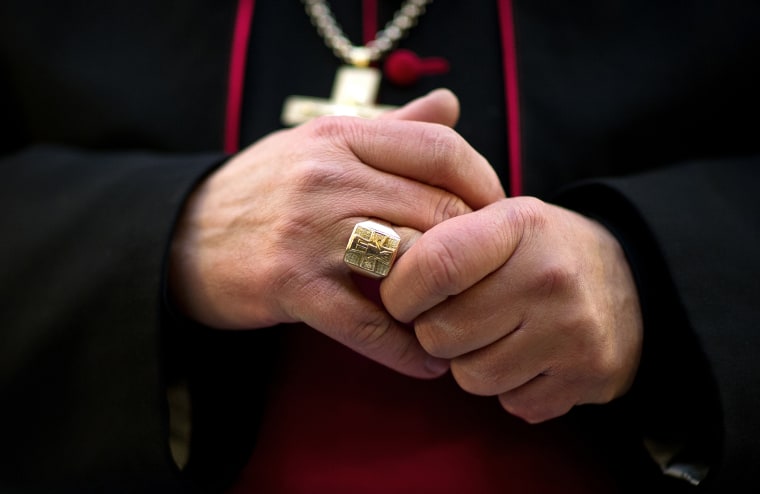In what is believed to be the first lawsuit of its kind, the American Civil Liberties Union is suing the United States Conference of Catholic Bishops and a Catholic hospital in Michigan for negligence in treating a woman with dangerous pregnancy complications.
The suit is on behalf of Tamesha Means, a mother of three who was 18 weeks pregnant when her water broke. At Mercy Health Partners (MHP), the Catholic hospital where she sought care (the only hospital within miles), no one told her her fetus had almost no chance of survival under the circumstances, or that she was at risk for serious infection if labor was not induced to terminate the pregnancy. Instead, she was sent home and told to come back a week later.
“There are disastrous consequences when religious hospitals hold themselves out as offering comprehensive care" but follow Catholic directives which can "endanger women’s health in the process,” said Kary Moss, executive director of the ACLU of Michigan.
At issue are the same Catholic directives for healthcare that have repeatedly pitted the bishops against the Obama administration, including most recently in requiring insurance coverage for contraception under the Affordable Care Act. In an interview with NBC's Meet the Press that aired last weekend, Cardinal Timothy Dolan said of the Affordable Care Act, "We Catholics, who are kind of among the pros when it comes to providing healthcare, do it because of our religious conviction, and because of the dictates of our conscience. And now we're being asked to violate some of those."
Means' case is similar to that of Savita Halapannavar, the Indian woman who died last year of infection in an Irish hospital after she was denied a termination during a miscarriage at 17 weeks. An official report found a “failure in the provision of the most basic elements of patient care.” Irish law was changed to allow abortions in cases of life endangerment.
Means contracted two serious infections during her ordeal, but survived. According to the complaint, her condition worsened as repeat visits to the Catholic hospital failed to result in adequate treatment. "As she waited to be sent home for the third time, the feet of the fetus breached her cervix and she began to deliver. The baby died shortly after birth. MHP then told Ms. Means she needed to make funeral arrangements."
Catholic directives broadly require that medical practitioners not do anything to intentionally end the life of an embryo or fetus, even when there is imminent risk to the woman carrying it. Whereas Halapannavar was, according to her husband, told she could not have an abortion because Ireland is a "Catholic country," Means did not even know what sort of care she was being denied. The suit says that if Means had "known the extremely low chance of fetal survival and the risk to her health from continuing the pregnancy, she would have terminated the pregnancy."
While the suit, filed in federal district court in Michigan, is unique, the circumstances are not, both in the hospital and beyond. The suit cites a public health educator who knew of at least five instances in which Mercy Health Partners did not induce labor in similarly dangerous situations. And a recent study by medical sociologist Lori Freedman published in the American Journal of Bioethics Primary Research did in-depth interviews with doctors at Catholic hospitals around the country and found that "when applied to cases in which patients were already losing a desired pregnancy and/or the patient's health was at risk, some physicians found the institutional restrictions on care to be unacceptable."
In November, the ACLU of Colorado filed a letter of complaint against a Catholic hospital after a doctor was reprimanded for mentioning abortion to a pregnant patient who he suspected had a serious heart condition.
Though hospital mergers have increased the number of patients who will be treated in Catholic hospitals, the implications of the directives aren't well known. The Michigan case, said Louise Melling, deputy legal director of the ACLU, is intended to "shine a spotlight on that practice... calling for its end." Though the case, which seeks monetary damages, could have been filed in Michigan state court, "given the importance of this case and the national implications, we chose to file in federal court," said Melling.
Separately, Michigan's legislature is about to take up the issue of insurance coverage for abortion, with a provision that would require women to purchase--separately, and in advance--insurance riders to cover abortion. A similar provision led to a veto by Republican governor Rick Snyder, who said the law “treats situations that involve rape, incest and health of the mother as elective abortions. I don’t believe it is appropriate to tell a woman who becomes pregnant due to a rape that she needed to select elective insurance coverage. Second, the abortion changes in this bill interfere in the current private market for insurance. Insurance companies and private buyers of insurance should be able to conduct their own affairs.”
But the predominately anti-abortion legislature may pass it with a veto-proof majority. That would put Michigan among the eight states that have restrictions on all private insurance coverage for abortion.
